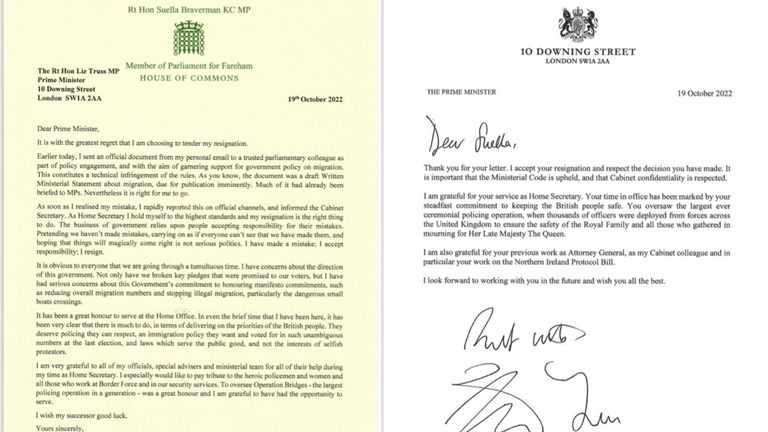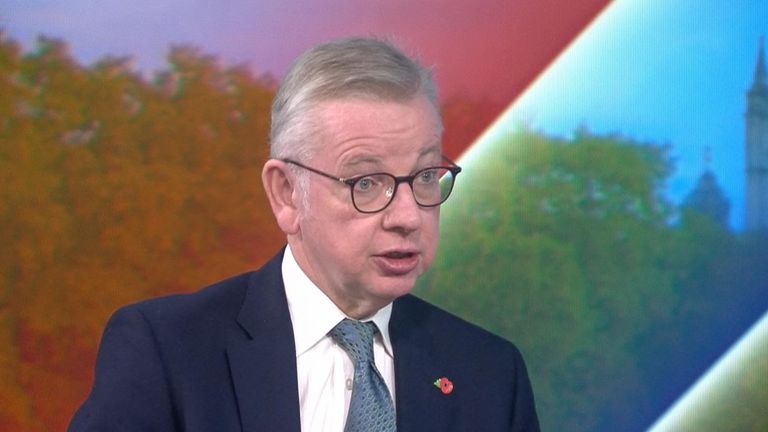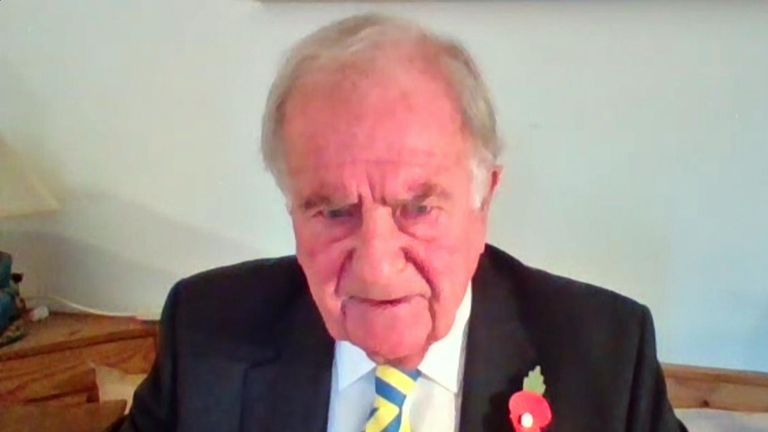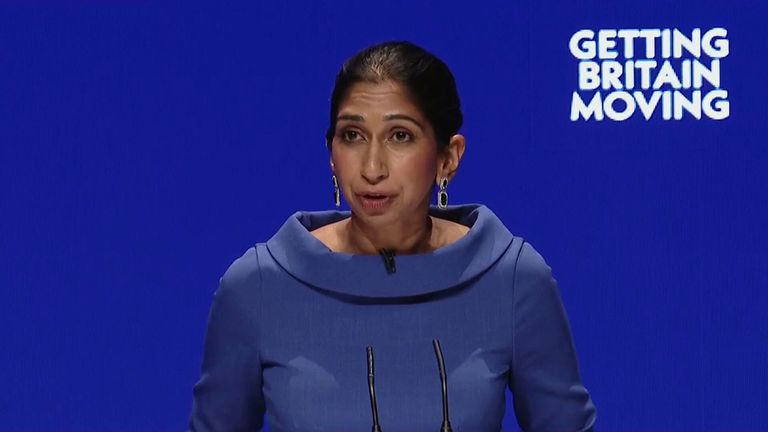
After becoming the new prime minister last week, Rishi Sunak made the controversial decision to appoint Suella Braverman as his home secretary – just six days after she had quit the role for breaking the ministerial code.
A week on, and questions are still being asked about why the PM brought her back after the breach, as well as whether her own performance in the job had contributed to dire conditions in a migration centre in Kent.
Here is what we know:
Why did she quit in the first place?
Ms Braverman was appointed by Liz Truss in September to take over the Home Office after securing some significant backing in the summer’s leadership contest.
But her tenure as home secretary came to end after she broke with security protocols by forwarding an official document to her personal email, and then sent it onto a fellow MP, copying in a parliamentary staffer by accident.
The document was a draft written statement on migration that was deemed highly sensitive as it related to immigration rules, which could have major implications for market-sensitive growth forecasts.
Much of the draft had been briefed to MPs but it was a serious breach of the ministerial code on two accounts – for sharing a statement ahead of time and sending it from a personal account.
Former barrister and ex-attorney general Ms Braverman agreed to quit – then published a scathing resignation letter to Ms Truss, in which she hinted the then PM should go as well over mistakes made during her premiership.
“Pretending we haven’t made mistakes, carrying on as if everyone can’t see that we have made them, and hoping that things will magically come right is not serious politics,” she wrote.
“I have made a mistake; I accept responsibility; I resign.”
She also used her letter to raise concerns about the government, saying it had “broken key pledges” and she had “serious concerns” about the government’s commitment to honouring manifesto commitments, especially on immigration.
Re-appointment criticism
Ms Braverman’s re-appointment by Mr Sunak less than a week later was criticised by opposition MPs and a former sleaze watchdog.
The new prime minister hired her after promising to lead the Conservative Party with “integrity, professionalism and accountability”.
But Labour accused him of doing a “grubby deal” instead to ensure the right wing of his party – where Ms Braverman is a key figure – would support him to take over Number 10, “trading security for support”.
Shadow home secretary Yvette Cooper has written to cabinet secretary Simon Case, who determined a security breach had happened, demanding a full investigation.
And Alistair Graham, former chair of the Committee on Standards in Public Life, said there were questions over whether her appointment was appropriate, especially because the breach was not examined by an ethics adviser.
“Normally the prime minister would have consulted a ministerial adviser for advice,” he said.
“A breach of the ministerial code is seen as a serious matter and would make any minister an inappropriate appointment to one of the four most senior positions in government.”
However, Mr Sunak has stood by the appointment and Levelling Up Secretary Michael Gove insisted to Sky News that Ms Braverman was a “first-rate, front-rank politician” who deserved to be back in cabinet.
On Monday, Ms Braverman sent a lengthy letter to the Home Affairs Select Committee to address issues related to her resignation, in which she set out in detail the timetable of what happened.
In it, she revealed that a Home Office review into her communications showed she had sent official documents from her government email to her private one on six occasions in the six weeks she was in the role.
“The review confirmed that all of these occasions occurred in circumstances when I was conducting Home Office meetings virtually or related to public lines to take in interviews,” she wrote.
She also said that before her reappointment she “gave the prime minister assurances” she would not use her personal email for official business and “reaffirmed my understanding of and adherence to the ministerial code”.
Manston chaos
While the row rages on about whether she should have been brought back, another argument is brewing over the treatment of people being housed at the Manston migration centre in Kent.
Last week, a Home Affairs Select Committee heard conditions at Manston were “wretched”, with overcrowding, outbreaks of diseases and people being held for weeks longer than the 24 hours intended.
The home secretary’s judgement has now been called into question after a report in The Times claimed she blocked the transfer of asylum seekers to new hotels and ignored legal advice that the government was illegally detaining people at the centre.
Local Tory MP Sir Roger Gale said the situation at Manston was a “breach of humane conditions”, with the facility holding 4,000 people when it is only designed to hold 1,000.
He said the circumstances “were a problem made in the Home Office”, saying within five weeks the system had been “broken – and it’s got to be mended fast”.
Sir Roger did not point the finger directly at Ms Braverman, saying “whoever is responsible, either the previous home secretary or this one, has to be held to account”.
But sources close to her predecessor, Priti Patel, told Sky News she signed off transfers from holding centres to hotels throughout the summer as she had a statutory duty to do so.
Labour’s Ms Cooper also claimed there had been “a failure to make decisions” within the government, causing the problems, and that Ms Braverman needed to make a statement.
Rwanda and reducing immigration
The home secretary’s return to government has also raised questions about Mr Sunak’s immigration plans and whether he made a deal with her to get her support.
She wants to keep net migration to “tens of thousands” and is keen on reducing overall migration, as stipulated in the 2019 Tory manifesto.
However, Mr Sunak is under pressure from business to ease migration rules to help fill job vacancies and boost growth.
One of Chancellor Jeremy Hunt’s main strategies to restore market confidence is to loosen some of those immigration rules so forecasts will have the government hitting growth targets.
But both Mrs Braverman and Mr Sunak are supporters of the Rwanda policy to deport Channel migrants to the east African country.
Mr Sunak said he would do “whatever it takes” to ensure the scheme worked while Mrs Braverman said it is her “dream” and “obsession” to see the first flight take off for Rwanda.
Thousands crossing the Channel
Pressure is also piling on the Home Office to act over the record of number of people who continue to cross the channel, with 1,000 arriving on Sunday.
The department is already grappling with a 100,000 backlog in processing asylum applications, with 96% of those from last year still outstanding.
On Sunday, refugee charities wrote to the home secretary demanding the government create more safe routes to the UK as a solution to stopping the dangerous small boat crossings.















